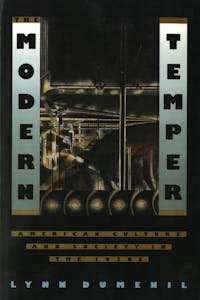The Modern Temper
American Culture and Society in the 1920s
 Download image
Download image
ISBN10: 0809015668
ISBN13: 9780809015665
Trade Paperback
368 Pages
$20.00
CA$20.00
When most of us take a backward glance at the 1920s, we may think of prohibition and the jazz age, of movies stars and flappers, of Harold Lloyd and Mary Pickford, of Lindbergh and Hoover—and of Black Friday, October 29, 1929, when the plunging stock market ushered in the great depression.
But the 1920s were much more. Lynn Dumenil brings a fresh interpretation to a dramatic, important, and misunderstood decade. As her work makes clear, changing values brought an end to the repressive Victorian era; urban liberalism emerged; the federal bureaucracy was expanded; pluralism became increasingly important to America's heterogeneous society; and different religious, ethnic, and cultural groups encountered the homogenizing force of a powerful mass-consumer culture. The Modern Temper brings these many developments into sharp focus.
Reviews
Praise for The Modern Temper
"The Modern Temper is an engaging, stimulating, and thoughtful re-creation of one of our most interesting and complex decades. A wonderful accomplishment."—Lawrence W. Levine, George Mason University
"Lynn Dumenil's The Modern Temper provides an exciting and original synthesis of a crucial decade that few of us really understand. She makes the insights and confusions of the women and the men of the twenties come alive. This is an important book."—Ellen Dubois, University of California at Los Angeles
"Dumenil offers wealth of fresh insights on a fascinating decade. This illuminating study subtly recasts our understanding of an era whose tensions and stresses often uncannily parallel those of our own day."—Paul Boyer, University of Wisconsin



